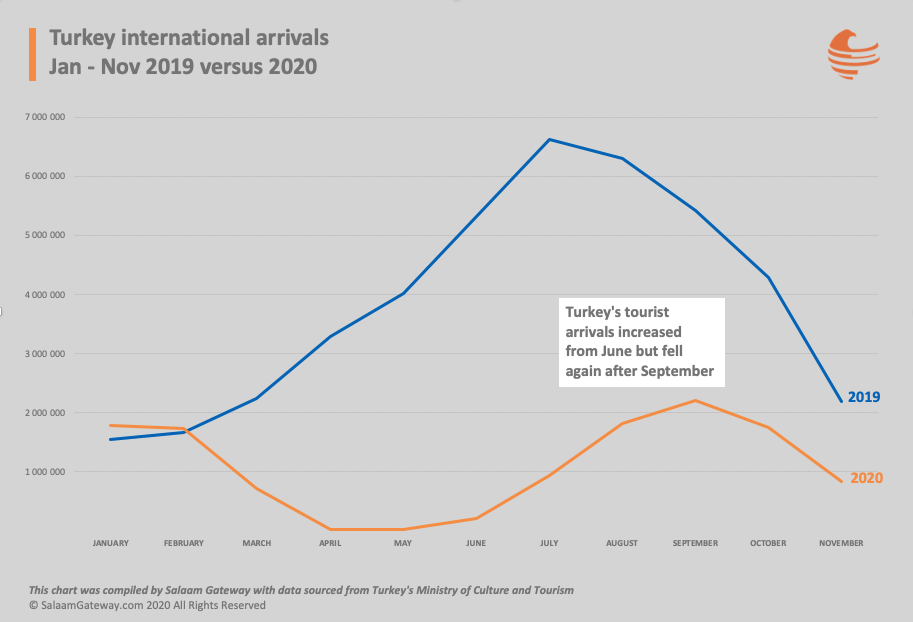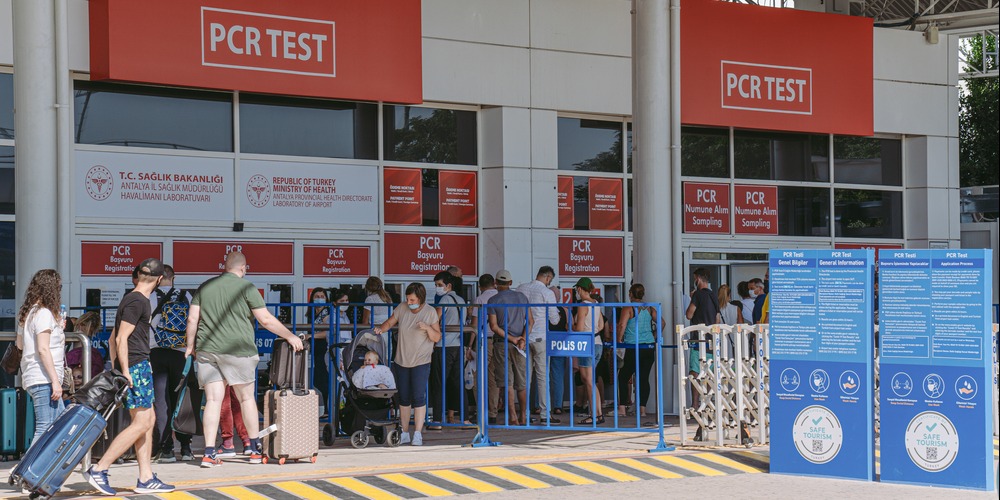HalalBooking, Turkey and the Caribbean: Muslim-friendly tourism moving past the pandemic
The travel industry is among the hardest hit by COVID-19 but Muslim-friendly travel bookings are on the rise again, Turkey is showing signs of recovery, and the Caribbean is making a compelling case to woo the Muslim tourist.
UK-based online travel agent (OTA) HalalBooking was used to seeing double-digit growth annually, until this year. The demand for travel returned once COVID-19 lockdowns were lifted, according to its chief marketing officer.
“[F]rom March till June, there was zero sales because of the lockdown situation. Then we had a very fast recovery. We saw more than 100% growth rate in August, 120% in September, and 100% in October,” said Ufuk Secgin, speaking at the World Halal Summit, which took place online and in Istanbul last week.
Secgin did not provide data for December, when European countries France, Germany, Italy, Netherlands, Spain and UK re-imposed restrictions as COVID cases surged.
When travel restrictions first hit the industry, the OTA adapted to the changing environment by increasing the number of properties on its website from 52,000 to 71,000. The company’s partnership with Expedia in July also helped it to substantially expand its range of properties. More than 10,000 of these list Muslim-friendliness information on aspects such as halal food, ladies-only facilities, and no-alcohol policies.
A lot of the newly-added properties were city hotels, chosen to meet the growing demand for local destinations as urbanites looked to staycations. HalalBooking says it has 300,000 registered users.
“Traditionally, we would have more sun-beach type of resorts in the Mediterranean and Southeast Asia in countries like the Maldives, Malaysia, Indonesia, and Turkey. But with many of our customers not being able to travel far, we offered them local options in big cities like London, Rome, and Paris,” said Secgin.
“It was a success because our customers appreciated these opportunities. It shows that there is demand and if you adjust as a travel company to the new situation, you can capitalize on it,” he said.
The company also introduced the ‘Book now, Pay later’ option and increased the number of properties offering ‘free cancellation’ rates.
Most importantly, it did not need to let go of any of its staff during the pandemic. “We are a lean company and operate with a small number of staff. We are about 50 people worldwide and technology is our focus. In that way, we are able to avoid redundancies,” said Secgin.
THE TURKEY FACTOR
External factors such as the emergence of HalalBooking's key market from lockdown, Turkey, also played a role in its strong comeback.
According to Secgin, Turkey’s Ministry of Culture and Tourism, Ministry of Health, and Ministry of Foreign Affairs were active in making sure the country was ready for the summer season with the Safe Tourism Certification program.
Because of these efforts, many of HalalBooking's top halal beach resorts in Turkey have reopened and hotels are being certified against more than 100 measures by Bureau Veritas.
About 6,250 facilities and vehicles have received certificates as of December 1.
Turkey’s Safe Tourism Certification program is currently compulsory for accommodation facilities with 50 or more rooms. By January 1, it will be compulsory for facilities with 30 or more rooms.
“All hotels, tourism operators, travel agencies, and taxis had to be COVID safe, and we were one of the first to go to Turkey to make videos and share with our customers so they could see it was a safe and enjoyable holiday. That’s why we have been successful in recovering,” said Secgin.
The sun-drenched resort city of Antalya has been the number one destination for Muslim-friendly beach holidays at HalalBooking.
“More customers who have experienced this type of holiday are coming back to us. We are now expanding to other destinations. The demand is vastly outweighing the supply,” said Secgin.
Newly-launched destinations on the website include Cote d’Azur, the Scottish Highlands, Lake Constance, Bosnia Herzegovina, Andalusia, and the Turkish Black Sea region.

TURKEY’S RELIGIOUS HERITAGE
During the peak of the pandemic and with the need for digitalization, Turkey Tourism Promotion and Development Agency (TGA) developed the country’s first digital experience, GoTurkey.com.
The platform will provide information on 81 cities in seven regions and will soon include a Muslim-friendly tourism section.
“Launching in January 2021, we will have a dedicated page for halal tourism and what Turkey has to offer. It will cover everything from halal food to halal-friendly accommodation and what to expect on a halal concept holiday as a Muslim traveller,” Elif Balci, deputy general manager at TGA, said at the World Halal Summit.
The halal tourism section will also list activities related to Ramadan, Eid Al Fitr and Eid Al Adha.
Tour packages are the best way to explore Turkey’s Islamic sites as religious heritage is an important factor for Muslim tourists choosing a destination, said Balci.
Turkey will be flaunting its many religious routes, Ottoman architecture, and Muslim relics. It is home to the Seljukian and Ottoman wooden mosques of Anatolia, which are rare examples of religious architecture with nail-less use of wood and handcrafted decoration. The country is also famed for its ancient city of Sanliurfa, which is known as the city of prophets and is believed to be the first place where Islam entered Anatolia.
“Turkey has a geostrategic advantage in regard to the global Muslim population. An estimated 400 million Muslims living outside of Turkey are within a five-hour flight. Within this radius, 31 million Muslims are in EU countries and 44 million are in Gulf countries,” said Balci.
CARIBBEAN
Away from Islamic countries, the Caribbean is the newest region to recognize Muslim-friendly tourism.
Suleiman Bulbula, co-founder and director of Barbados Halal Experience, is banking on the region’s unspoilt beauty and tourism-ready infrastructure to attract Muslims.
“What many Muslim travellers will not realize is the presence of Muslims in the Caribbean for a long time. Muslims practice their faith in this part of the world freely; we have halal food and mosques, and all the necessary ingredients for halal tourism,” said Bulbula.
The history of Muslims in the Caribbean stretches back over one thousand years, predating European contact by over six centuries, according to American-Canadian Islamic lecturer and historian Abdullah Hakim Quick.
“In the last 10 years, the leading destinations in the halal tourism market have been Muslim-majority countries, but this market dominance is beginning to shift. Many Muslims are now looking for new destinations outside Organization of Islamic Cooperation countries. The Caribbean is one of the regions that is ready to provide these options,” said Bulbula.
“The increasing availability of halal food, Muslim-friendly amenities and prayer facilities is making it easier and more enjoyable for Muslims to travel to the region.”
With more than 7,000 islands, the Caribbean relies heavily on tourism. An estimated 30 million visitors contributed $59 billion towards the region’s gross domestic product in 2019, accounting for 50 to 90% of the GDP for most of the countries, according to the International Monetary Fund.
“Caribbean governments are already planning for post-COVID. A focused effort coupled with more investment in the halal brand will make the Caribbean an attractive destination for halal tourism,” said Bulbula.
(Reporting by Heba Hashem; Editing by Emmy Abdul Alim [email protected])
© SalaamGateway.com 2020 All Rights Reserved
